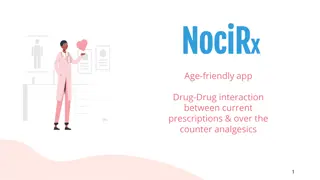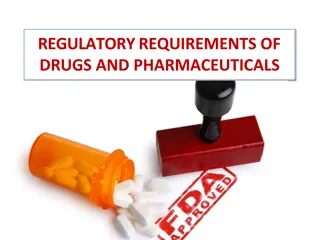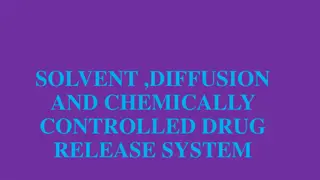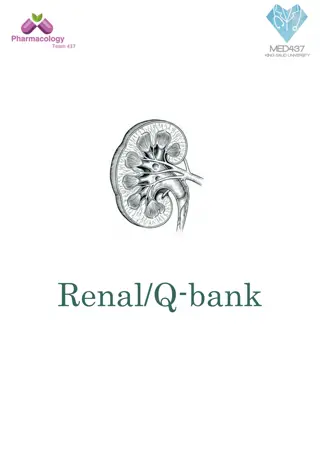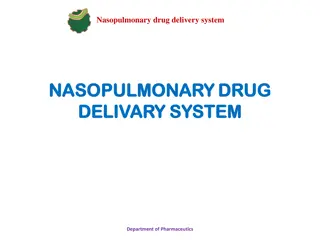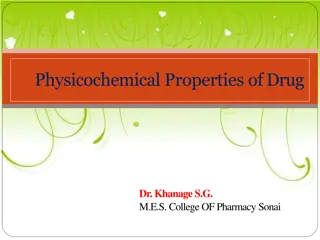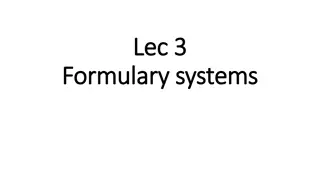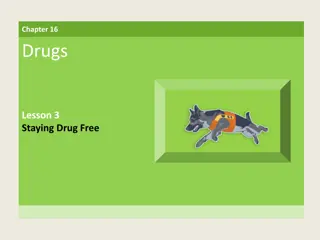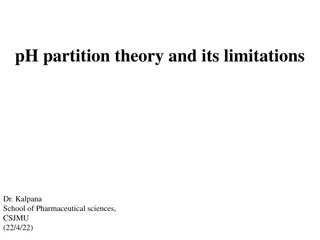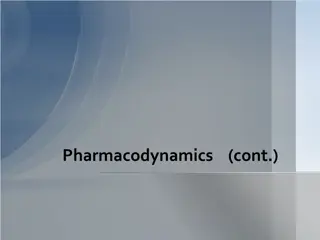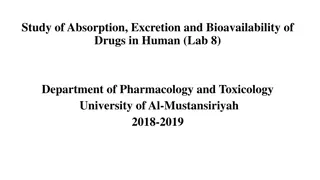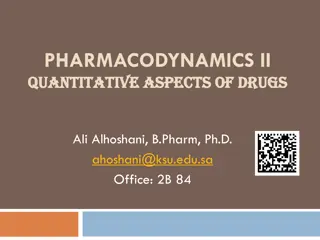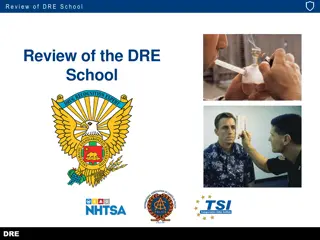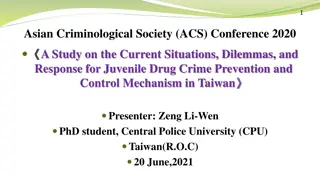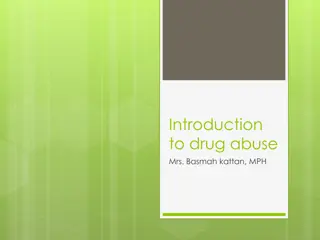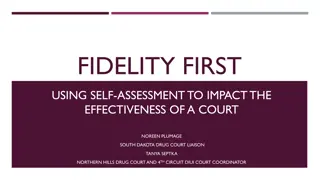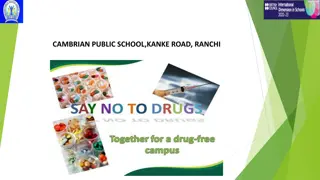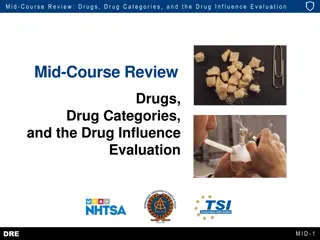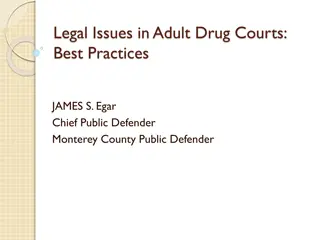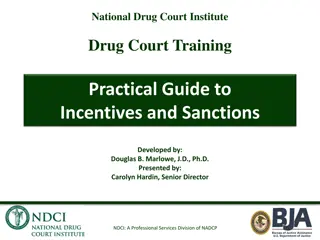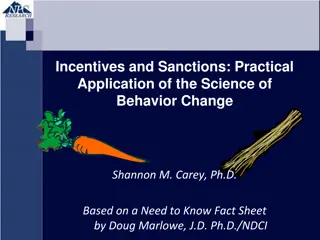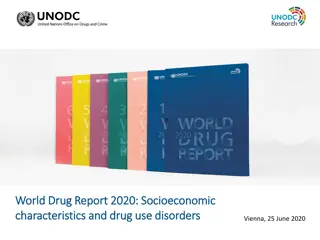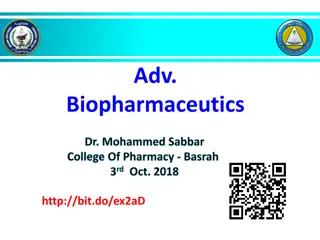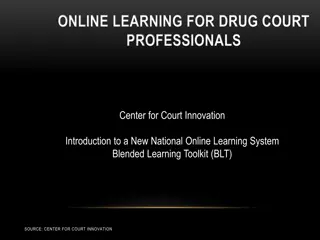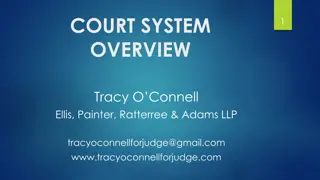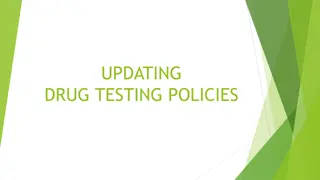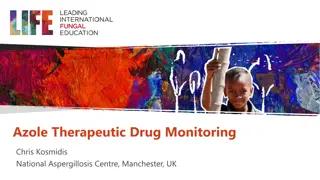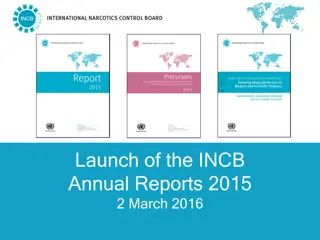Prior: Art. 66(b)(1): Appeals by Accused – A Court of Criminal Appeals shall have jurisdiction of a timely appeal from the judgment of a court -martial , entered into the record under section 860c of this title (article 60c), as follows:
The content outlines amendments introduced in the FY23 NDAA regarding appeals by accused individuals in court-martial cases and modifications to court-martial findings and sentences. It details the expansion of jurisdiction for Court of Criminal Appeals, the powers granted to the Judge Advocate Gene
2 views • 12 slides
Age-Friendly App: Managing Drug-Drug Interactions Between Prescriptions and OTC Analgesics
The Age-Friendly app addresses the crucial issue of drug-drug interactions between current prescriptions and over-the-counter analgesics in the geriatric population. With a significant percentage of OTC sales attributed to older adults, there is an increased risk of adverse drug events due to polyph
1 views • 25 slides
Understanding Regulatory Requirements of Drugs and Pharmaceuticals
Drug regulation involves controlling drug use through international agreement authorities like the FDA, EMA, and PMDA. The FDA plays a crucial role in drug evaluation and research, biologic evaluation, devices, and food safety. There are various types of applications for drug approval, along with a
0 views • 28 slides
Polymeric Controlled Drug Delivery Systems
Polymeric controlled drug delivery systems play a crucial role in regulating drug release through diffusion, solvent penetration, and chemical mechanisms. These systems include diffusion-controlled, solvent-controlled, and chemically-controlled devices, each operating based on specific principles. S
0 views • 33 slides
Renal Pharmacology: Drug Excretion and Renal Clearance Questions
This comprehensive set of questions and answers covers topics related to drug excretion and renal pharmacology. It includes information on glomerular filtration, drug excretion mechanisms, dosage adjustments in renal impairment, factors influencing drug excretion, and the effects of long-term NSAID
0 views • 55 slides
Understanding Nasopulmonary Drug Delivery System
Nasopulmonary drug delivery system, utilizing the nasal route for drug administration, offers advantages such as hepatic first-pass metabolism avoidance and rapid drug absorption. This system is beneficial for pharmacologically active compounds with poor stability in gastrointestinal fluids. While i
0 views • 35 slides
Understanding Physicochemical Properties of Drugs
The physicochemical properties of drugs play a crucial role in their pharmacological effects. These properties include physical and chemical characteristics that influence interactions with biomolecules. Solubility, partition coefficient, and dissociation constant are key factors affecting drug beha
1 views • 46 slides
Understanding Formulary Systems in Healthcare
A formulary is a dynamic list of medications curated by healthcare professionals to guide drug selection based on efficacy, safety, cost, and patient acceptability. It plays a vital role in promoting evidence-based and cost-effective drug therapy, improving communication between prescribers and phar
0 views • 17 slides
Ways to Stay Drug Free: Lessons for Teens and Families
Understanding the reasons behind drug usage among teens, this lesson provides valuable resources and strategies to stay drug-free. It emphasizes the importance of making healthy decisions and offers alternatives to drug use. Additionally, it highlights the significance of saying no to drugs, provide
0 views • 17 slides
Understanding the Hatch-Waxman Act: Promoting Affordable Generic Drugs
The Hatch-Waxman Act, also known as The Drug Price Competition and Patent Term Restoration Act, was enacted in 1984 to amend patent laws and the Federal Food, Drug, and Cosmetic Act. It aims to reduce costs associated with generic drug approval, allow early experimental use, compensate branded drug
0 views • 49 slides
Understanding Biopharmaceutics: pH Partition Theory and Drug Absorption
Biopharmaceutics explores how drug properties and administration methods impact drug absorption. Factors affecting oral absorption include membrane physiology and drug partitioning based on pH levels. The pH partition theory, explained by Brodie et al., highlights the role of drug lipid solubility a
0 views • 9 slides
Importance of In-Vitro Dissolution Testing in Drug Assessment
In drug development, in-vitro dissolution testing plays a crucial role in evaluating drug release from tablets when in-vivo bioavailability studies are limited. By ensuring drug release is close to 100% and uniform batch to batch, these tests help assess drug availability and effectiveness. Regulato
11 views • 10 slides
Understanding Pharmacodynamics: Potency and Efficacy
Pharmacodynamics explores how drugs interact with receptors in the body, affecting the magnitude of drug effects based on concentration. Graded dose-response relationships, potency, and efficacy play key roles in determining drug efficiency. Potency reflects the amount of drug needed for a specific
0 views • 21 slides
Understanding Drug Absorption, Excretion, and Bioavailability in Humans
Delve into the complex processes of drug absorption, excretion, and bioavailability in the human body. Learn about the various factors affecting drug absorption from the gastrointestinal tract, including biological, physiochemical, and pharmaceutical factors. Explore the mechanisms of drug transport
0 views • 24 slides
Understanding Quantitative Aspects of Drug Action
Explore the quantitative aspects of drug action, including drug receptor binding, concentration binding curves, dose-response curves, and types of antagonism. Learn to relate drug concentration to receptor binding capacity and response produced. Discover how concentration binding curves and dose-res
0 views • 29 slides
Review of DRE School and Drug Evaluation Techniques
Explore key topics such as the definition of drugs for DRE purposes, basic drug statistics, review of symptomatology, and vital signs assessment in the context of Drug Recognition Expert (DRE) training. Learn about CNS depressants, stimulants, hallucinogens, and analogs, as well as vital signs like
0 views • 29 slides
Study on Juvenile Drug Crime Prevention in Taiwan: Insights from ACS Conference 2020
This presentation at the Asian Criminological Society Conference 2020 delves into the current situation, dilemmas, and responses regarding juvenile drug crime prevention in Taiwan. The presenter, Zeng Li-Wen, a PhD student at Central Police University in Taiwan, provides valuable insights based on t
2 views • 20 slides
Appellate Decisions Impacting Law Enforcement Officers: Summary & Updates
This collection covers selected appellate decisions impacting law enforcement officers from June 1, 2017, to June 1, 2018. It includes insights from the U.S. Supreme Court, Fourth Circuit Court of Appeals, Virginia Supreme Court, and Virginia Court of Appeals. Topics include Fourth Amendment, Fifth
1 views • 111 slides
Understanding Drug Abuse: Definitions, Effects, and Stages
Drug abuse is a serious issue involving various substances like prescription drugs, alcohol, and illegal drugs. This includes terms and definitions, effects on the body and mind, stages of addiction, and withdrawal symptoms. Factors influencing drug action and reasons for drug use are also explored.
5 views • 45 slides
Understanding Drug Targets and Mechanisms of Action
Explore the intricate world of pharmacokinetics and pharmacodynamics, from drug absorption to their interaction with biological molecules. Learn about different drug targets, such as proteins and ions, and how drugs alter their biochemical and biophysical activities. Dive into molecular mechanisms o
3 views • 17 slides
Eighth Judicial District Specialty Court Programs in Clark County
Eighth Judicial District Specialty Court Programs in Clark County serve 1200-1500 residents annually with various programs such as Substance Abuse Treatment, Adult Drug Court, DUI Court, Juvenile Drug Court, and more. Established in 1993, these programs aim to improve public safety, reduce criminal
1 views • 10 slides
Impact of Self-Assessment on Court Effectiveness in Drug Court Programs
Using self-assessment to impact the effectiveness of drug court programs is crucial for ensuring fair and consistent behavior modification. This approach enhances visibility, ensures accountability, and identifies areas for improvement. Success in drug court programs requires a thorough evaluation p
0 views • 24 slides
International Day Against Drug Abuse and Illicit Trafficking 2022 Initiatives and Awareness
The United Nations observes 26th June as the International Day Against Drug Abuse and Illicit Trafficking to combat substance abuse worldwide. Various initiatives like the National Drug Master Plan, Nasha Mukt Bharat Abhiyaan, and the National Action Plan for Drug Demand Reduction aim to raise aware
3 views • 9 slides
Comprehensive Review of Drugs, Categories, and Drug Influence Evaluation
This mid-course review covers key aspects such as defining drugs, naming drug categories and subcategories, identifying drug categories for specific drugs, components of drug influence evaluation, and examinations conducted as part of the evaluation process. The content also includes identifying dru
0 views • 28 slides
Best Practices in Adult Drug Courts: Legal Issues & Key Components
Explore the legal aspects and best practices in adult drug courts, including the integration of treatment services with the justice system, ensuring the right to counsel, and the ten key components like identifying participants early, providing access to treatment services, and monitoring abstinence
0 views • 54 slides
Practical Guide to Incentives and Sanctions in Drug Court Training
Comprehensive guide developed by Douglas B. Marlowe, J.D., Ph.D., and presented by Carolyn Hardin from the National Drug Court Institute, covering basic terminology, carrot and stick approach, goal-setting strategies, treating substance dependence, delivering sanctions, building trust, importance of
0 views • 29 slides
Practical Application of Incentives and Sanctions for Behavior Change in the Court System
This resource discusses the practical application of incentives and sanctions in behavior change within the context of drug courts. It covers the purpose of sanctions and incentives, reliable detection methods like urine drug testing, and includes real-life examples such as phone transcripts from co
0 views • 42 slides
Impact of Socioeconomic Conditions on Drug Use Disorders: Insights from World Drug Report 2020
The World Drug Report 2020 highlights the strong correlation between socioeconomic factors and drug use disorders. Studies reveal that communities facing poverty, violence, and social inequality are at a higher risk of drug overdoses and addiction. Factors like income inequality, lack of social capi
1 views • 17 slides
Understanding the Role of Drug Court Defense Attorneys
Drug court defense attorneys play a crucial role in the success of drug court programs by advocating for their clients, ensuring fair sanctions, guiding through plea processes, handling grievances, and representing clients in hearings to uphold justice and support their rehabilitation journey.
0 views • 10 slides
Understanding Targeted Clinical Investigation in Pharmacovigilance
Targeted clinical investigation plays a crucial role in pharmacovigilance by further evaluating significant risks identified in pre-approval clinical trials. This involves conducting pharmacokinetic and pharmacodynamic studies, genetic testing, interaction studies, and large simplified trials to ass
0 views • 12 slides
Advances in Ophthalmic Drug Delivery Systems
This content explores various advanced ophthalmic drug delivery systems including erodible ophthalmic inserts, soluble ocular drug inserts, new ophthalmic drug delivery systems, and bioadhesive ophthalmic drug inserts. These innovative systems aim to provide accurate dosing, prolonged drug release,
0 views • 8 slides
State Responsible Inmates with Marijuana Convictions Research Report
Research conducted by VADOC indicates a total of 570 state responsible inmates incarcerated for marijuana-related offenses as of August 31, 2021. Among them, 229 inmates had non-drug-related Most Serious Offenses, 331 were convicted for Drug Sales MSO, and 10 were convicted for Drug Possession MSO.
0 views • 7 slides
Innovative Online Learning for Drug Court Professionals
Center for Court Innovation has introduced a new National Drug Court Online Learning System aimed at assisting drug court professionals. This system offers free access to web-based training, expert video lessons, virtual site visits to drug treatment courts, practitioner interviews, and a resource l
0 views • 8 slides
Overview of Georgia Court System
Detailed exploration of the Georgia court system, including the dual court system in the U.S., Supreme Court of Georgia jurisdiction, Court of Appeals jurisdiction, Chatham County Courthouse, and various courts within Chatham County. It covers civil and criminal cases handled by different courts, ju
0 views • 20 slides
Understanding Drug Testing Policies in the Workplace
The Drug-Free Workplace Act of 1988 mandates federal grant recipients to implement zero-tolerance drug policies to maintain a drug-free environment. Employers must establish clear policies, conduct awareness programs, offer counseling and rehabilitation services, and impose penalties for violations.
0 views • 19 slides
Understanding the U.S. Court System: Jurisprudence and Structure
Law enforcement officers play a crucial role in the criminal justice system by understanding criminal jurisprudence and the court system's structure. This includes knowledge of different court levels, jurisdiction, and the adjudication process. The duality of courts, such as adult vs. juvenile court
0 views • 43 slides
Understanding Azole Therapeutic Drug Monitoring for Antifungal Therapy
Azole therapeutic drug monitoring (TDM) is crucial for managing antifungal therapy due to factors like drug interactions, compliance issues, disease severity, and pharmacokinetic variability. This monitoring helps ensure optimal drug levels are maintained for effective treatment. Different TDM metho
0 views • 18 slides
Overview of International Drug Control Efforts and Challenges in 2015-2016
The content highlights significant events related to international drug control efforts, emphasizing the launch of the INCB Annual Reports, the UNGASS session at the United Nations, and the focus on health, welfare, and challenges in combating drug abuse. It discusses issues such as new psychoactive
0 views • 13 slides
Analgesic Study with Three Treatments Crossed with Gender
This study explores the effects of analgesic treatments crossed with gender on pain levels. The data analysis includes factors such as gender and drug type, and the statistical model examines pain index as a linear function of factor levels. The ANOVA results indicate significant effects of gender,
0 views • 17 slides
Understanding Quantitative Aspects of Drug Action
Explore the quantitative aspects of drug action, including drug receptor binding, dose-response curves, therapeutic utility, and types of antagonism. Learn about drug affinity, efficacy, potency, and the relationship between drug binding and concentration. Discover how concentration-binding curves a
0 views • 18 slides

